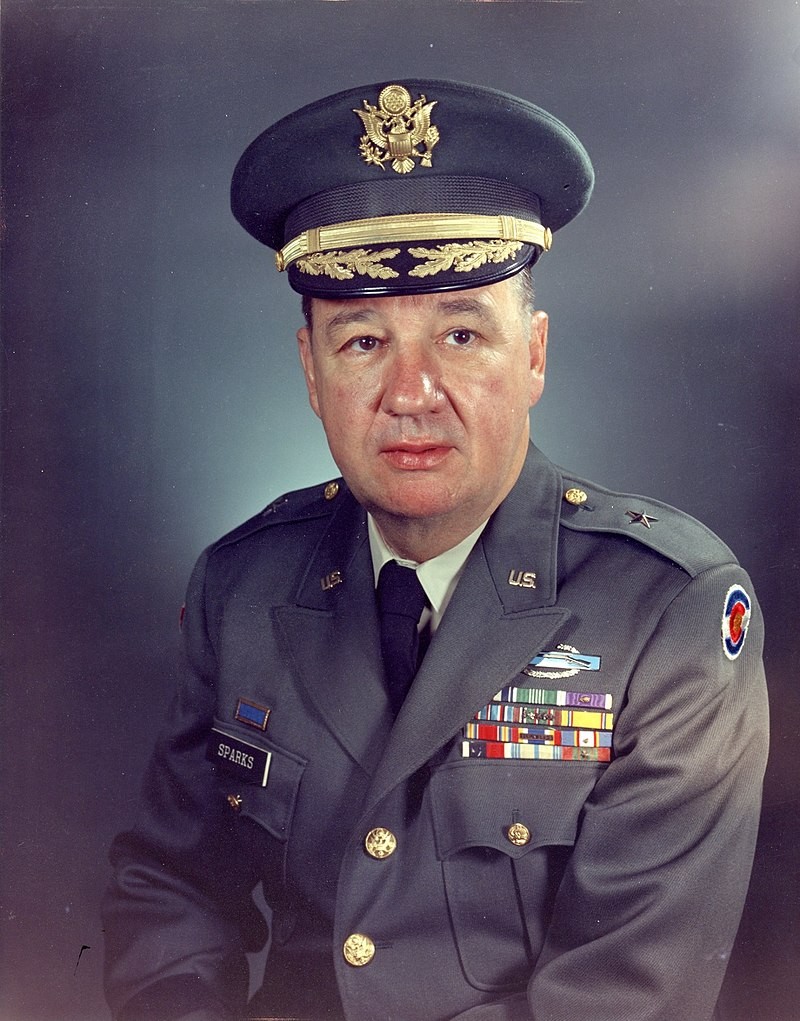Felix Spark joined the United States Army in 1936. He served in Hawaii and was assigned to the coastal artillery. He was discharged from the service after two years, after which he began his studies. In the meantime, he participated in military boot camps for citizens. When World War II broke out, he served as a second lieutenant in the United States Army Reserves. He returned to active duty in early 1941, assigned to the 45th Infantry Division of the “Firebirds.”
On April 29, 1945, Felix Sparks was ordered to “secure the concentration camp” at Dachau. The weather was rough, and there was a shootout with the Germans on the outskirts of the city. The Americans arrived at the camp, by the ramp, and at one point Sparks’ soldiers smelled a terrible stench. Being surprised, they saw some wagons. He looked into the first freight car and saw a 3-meter-high pile of bodies stacked like firewood. The dead were lying naked, with vermin and human excrement all around. On the trails, there were 39 wagons, signifying thousands of human bodies. At the sight of the murdered,
Sparks froze motionless, then vomited. Most of all etched in his memory was the sight of a little girl with her eyes open, lying on top of a pile of bodies. American soldiers mostly stood stunned, some cursing, others crying. Felix Sparks ordered to go deeper into the camp. Inside, the first building they saw was a brick house where an SS family lived in. Around it was a rose garden, the grass in it was evenly trimmed. Felix Sparks recalled that the sight was surreal.
A second group, led by Lieutenant Walsh, also entered the camp. The Americans encountered the first SS men, who were killed on the spot. Sparks heard the shots and came running. To his eyes appeared Walsh, who was beating on the head of an SS man with a rifle butt, shouting “Bastards! Bastards! Bastards!” Sparks took charge, Walsh testified later:
I will be honest. I broke down. I started crying. It all overwhelmed me.
The Americans entered the camp’s SS hospital. Soldiers led them to a wall in the coal yard. Sparks, meanwhile, searched more rooms. He reached the crematorium, where piles of decomposing bodies lay all around. The Germans did not have enough coal to burn all the corpses. Sparks later recalled:
The corpses were decomposing, the stench of death was simply unbearable.
Around noon, soldiers of the 42nd Infantry Division under General Linden arrived at Dachau. They were surrendered by Heinrich Wicker, who had recently arrived at Dachau, leading prisoners from another camp. Meanwhile, Sparks’ soldiers gathered the SS men in a coal yard and lined them up against a wall, then opened fire on them with machine guns. Over the next few hours, members of the camp staff were killed in various places. The Americans were killing Germans, but they also did not stop the prisoners from carrying out self-sacrifice.
Sparks approached the gate with the sign “Arbeit Macht Frei,” asked for an interpreter and spoke to the prisoners gathered at the gate. Sparks recalled that prisoners were everywhere, chanting “America, America.” Some squeezed through the barbed wire, others climbed onto the roofs of the barracks in whole groups and waved their arms, rejoicing in their freedom.
